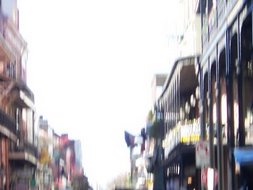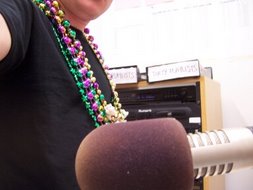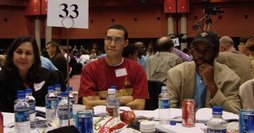 The Greatest Ever
The Greatest EverFog cloaks the tops of the office towers in the Central Business District as we make our way down Camp Street. Another New Orleans morning is refusing to grow into day before its time. Approaching Lafayette Park, we—my girlfriend, Kim, her friend Heather, and I--hear the sound of a marching band. When we reach the edge of the park, we can see the band amassed on the steps of Gallier Hall, our destination. Heather is a lawyer in the Nagin Administration and invited us to share her tickets for the Mayor’s King Cake Party. We pass under a set of bleachers that’s been on the Carondelet side of the park since I arrived in the city 2 months ago. A group of red-and-black clad cheerleaders block our path to the steps, so we walk down Lafayette Street and through the side entrance.
Inside the modestly sized ballroom, banquet tables of coffee and king cake stand along two walls. The crowd bubbles with Saturday morning greetings as a small brass band plays in one corner. Green, purple, and gold banners billow from the ceilings and curtains cut into tragedy/comedy masks hang over the windows. A dais with a podium holds several dignitaries. There are maybe 100 people present.
On one wall, a mural in 3 panels, each 10 feet tall, portrays a strange scene of bacchanalia, with light pink and sky blue the dominant colors. In the first panel, a slave in chains pulls a chariot (or is pulled by it) in front of several broken pillars. The pillars belong to a façade not unlike that of Gallier Hall. In the center panel, a group of asexual pans plays flutes at the foot of a large staircase. Instead of the wooden or ivory flutes of mythology, the pans’ flutes look modern, much like those played in the band outside. The last panel shows a pinkish, Rubensesque woman prancing festively with one hand held aloft, a mask covering her face. A shirtless black (colored dark blue) man escorts her, clarinet in his hand.
For some reason, the entire University of Maryland marching band floods into the room from doors on either side of the hall. They are split in two halves, with one group to the left and right of the dais. The cheerleaders take seats in the back, safely out of sight, but the youngsters in the marching uniforms are forced to stand throughout the ceremony. Even worse, the group to our left must watch sheepishly, instruments reduced to props, as the brass band continues to play next to them. As the event proceeds, I keep peeking at these unlikely visitors, their baby-fat faces and shaggy haircuts topped by tall hats. Bodies swaddled in red, white, and black wool, they do their best to melt into the wallpaper, but there’s too many of them to hide.
Kim says to look and I see a Mardi Gras Indian standing amidst the other group of U of M band members on the right side. He wears a large headdress of black feathers, a leopard print vest and bandana, and a shield of white feathers over his chest. In one hand he shakes a tambourine, and in the other he carries a staff topped with a rack of antlers. Then a second, younger Indian enters, this one covered in red and yellow feathers, his headdress much larger, nearly burying his solemn brown face. He carries a golden flag with his name printed on it: Spy Boy Golden Comanche. They start to whoop and holler and strut their way to the brass band, which increases in volume as the Indians approach. A crowd of news cameramen surrounds the two Indians as they dance, the spotlights and flash bathing the costumed men.
The crowd: largely African American, likely staffers and friends of the mayor, as well as a contingent from the Zulu Social Aid & Pleasure Club, famous for their parade and today wearing their mustard-colored sports coats. Many of the people gathered appear to know one another, or want to meet each other. There are lawyerly looking white men in business suits, women who could be at church or in the office, and some other fellows who might be off-duty cops. The cheerleaders in the back clap in time to the brass band, which chugs along anonymously as the U of M kids look bewildered and trapped, the pretty ladies smile and exchange greetings, and the three of us bob lightly in the middle of the swirl.
Suddenly, the brass band stops and the U of M band plays a loud phrase of military pomp. Then a woman in a business suit makes a “CUT” motion with her hand and the drum major kills the music. Nagin walks in all smiles, pointing to people, wearing a shirt and jacket, no tie. He sits down on the dais next to the other dignitaries. The podium remains awkwardly empty for a few moments until Ray stands up and says, “How y’all doing?” Then his spokeswoman, the unfortunately named Ceeon Quiett, bustles up and takes her place at the mike and Nagin sits back down.
Quiett is flustered and appears embarrassed by her missed cue. She talks about the importance of Twelfth Night, and of the epiphany of the wise men and their visit to the manger, which marked the first Twelfth Night and the beginning of Carnival. (I admit, I did not know about this holiday prior to today). Mardi Gras is the most unique, most elaborate Carnival there is, she tells us. Then she re-introduces Ray.
“Are you ready for some Mardi Gras?” he asks us in his best Carnival barker tone. A weird thing about Nagin is what a good speaker he is, folksy and vaguely Afro-centric, more like a good, common sense buddy than preacher or pol. He seems at ease, amazed at the goodness of the occasion and the progress of the city. He says “Mardi Gras” over and over again, the way Bush says “Freedom,” as if the term itself solves everything.
“We will come back,” he tells us, because we’re still “the greatest city ever,” and this is going to be “the best Mardi Gras ever.” This is all another step in our return. He wishes everyone a happy Mardi Gras and takes his seat, and the lady sitting next to him playfully places a green-purple-gold boa around his neck. Nagin looks simple and self-deprecatory in drag. As the next speaker begins, he takes the boa off, probably at his wife’s urging. She’s in the front row and seems to understand the decorum necessary at a public appearance.
For the rest of the ceremony, I keep an eye on Nagin. Most of the time, he stares vacantly out the windows in the back of the room. And, as usual, every time I think he’s completely gone, he’ll grab onto something someone says and offer a loud comment or appear enthusiastic, then descend into silence.
The next speaker is a beefy middle-aged white guy from the tourism bureau who tells us that the staff in his office has a saying: “Soul is waterproof.” He goes on to say that this will be the Mardi Gras where “we get our swagger back.” Nagin throws up a little black power fist when the guy says he’s sure this will the “safest Mardi Gras ever.” A few days later, as citywide bloodshed surges, this same official pleads against a curfew, lamenting the potential ire of tourists who want to stay out all night.
This guy is followed by an ecstatic, pudgy white woman wearing a black and red shawl, her colorless hair pulled back severely. She grins her brains out and tells us how special our smiles are, then compliments the U of M band on their volunteer work this weekend. Everyone stands to applaud. The nice lady then acknowledges the Mardi Gras Indians, and Kim and I stand up, but no one joins us. Finally, this woman closes with the dubious comment, “Let the game begin.” Huh. What game?
Up next is a serious man from the hotel association who has a hard time speaking in front of people. He loosens up a little bit by mentioning the recent victories of both the Saints and LSU football teams. He thanks many people, including the mayor and the police chief. It’s the first I’ve noticed Chief Riley, the man I was most interested in sizing up this morning. Later, after the speeches are over, I see that he’s a pudgy sort of guy, not very tall, and a little slumped. His age is hard to discern, and he seems at pains to appear sincere, but not anxious.
In a year-end press conference this week, the chief made note of the fact that the 162 murders in N.O. for 2006 were the lowest in years. Only after some prodding did he admit that, well, yes, we have less than half the population and the per-capita rate is way up. This little attempt at spin was followed by 7 murders in the first 5 days of 2007. Hopefully the chief works harder this year at stopping the bloodshed than he has at his deception techniques.
Applause, applause, and then another speaker, this one an official from the mayor’s Mardi Gras committee who’s also a member of the Krewe of Rex, one of the largest parade groups. He admits that no report was done last year on the economic effects of Mardi Gras, but, really, who had the time? Seems like a weird opening note, except that it clears away any negative statistics or doubt in favor of a suck-off of Nagin. This guy says Nagin was always there for the Mardi Gras committee, and was single-handedly responsible for an 80% participation by krewes across the city. Then he introduces this year’s King Rex, a burly old bald white guy with slightly menacing eyes. King Rex, too, makes reference to the great Maryland marching band, many of whose members smile nervously.
Zulu follows Rex, specifically the president of the Zulus, an older black guy with gray hair and a genial tone. He thanks everyone, and reports that, after a decline of 1/3 in membership last year, the Zulus are back and even have a waiting list to join. It’s his pleasure to introduce this year’s King Zulu, who was originally nominated in May 2005 and has waited ever since to take his rightful place. King Zulu steps to the mike, a younger man than the president, similarly clad in mustard jacket but wearing a black fedora, white gloves, and a black sash with the words “Hammer Time” on the back. He gives Nagin a jeweled coconut, traditional booty of the Zulu. At this point, Kim says, “Wow, the Zulus are just taking this party over”, and indeed they bring up their poster artist, a young guy with braids whose work is a lot more impressionistic than the Rex artist’s. The Zulu poster includes surfboards and the Superdome at its center.
Quiett is about to make her closing remarks when someone points out that officials from the Krewe of Endymion are in the building. She invites them up to make their remarks, the one man bearing a strong resemblance to Trent Lott, the other a sixty-something guy with dyed brown hair. Trent Lott mentions the involvement of rock groups Journey and Styxx in this year’s parade, as well as Al Green. He makes an off-colored joke about only knowing Al Green as a preacher, whereas dyed-hair man knows him “from when he was eating grits,” which I guess is sexual slang. People whistle and the dyed-hair guy takes the mike and happily makes some celebratory comments.
At this point, Quiett resumes her remarks, which concern the greatness of New Orleans and the historic import of Twelfth Night. She emphasizes this with a hard-to-follow anecdote about George Washington marrying Martha on Twelfth Night, and how Washington cared more about Twelfth Night than Xmas anyhow. Finally, she closes by wishing us a great Mardi Gras and directing us to the banquet tables where the Mayor and his wife will cut the first King Cake of the season. Everyone applauds, the UM band starts blaring, and we all make our way to the well-stocked banquet tables. People mingle on one side of the room while on the other the cheerleaders file past by me and the Indians begin a second line. The best Mardi Gras ever is underway.
Police and Thieves
That night I leave a party in the Irish Channel around 2am. I tell no one of my departure, never being too big on goodbyes and figuring it’s time for me to get my ass home. I know it’s a decent walk, but compared to the purposefully aimless wanderings I’d done in New York, what’s a few blocks? Plus, I haven’t walked home in New Orleans since I’d returned. It’s a nice enough night, I think, and I can use the time to review the last week. Budweiser can in hand, I begin the trek, walking from my friend’s place on Phillips Street and down Magazine.
Somewhere past Jackson Avenue, I notice a white SUV pull over to the curb next to me. I keep walking, figuring this had nothing to do with me. If they were considering it, I think, they probably saw I’m just some little dude on a stroll with a beer. My mind wanders, until as I cross onto my block at Euterpe Street, I think I spot the same white SUV. Is it…? I think. Nah. I’m almost at my front gate when I hear running footsteps. I turn to see a young black man in a black t-shirt and baggy jeans. He cradles some kind of machine gun in his thin arms.
“Hey! Hey! Gimme all your money. Gimme all your money!” Now he stands facing me with the gun waving around, mostly aimed at my legs and feet. He has his hair in short braids, a bony, angry face, and is about my height. He’s nervous as hell.
“Alright, alright,” I say. “I only have six bucks.” I hand that to him. Maybe it’s the night’s intake, but I’m not feeling particularly startled. There’s something strangely routine about all this…except for the size of the gun.
“Gimme the wallet!” he hisses.
‘Man,” I say, “you want my wallet? There ain’t—“
“Gimme the wallet!”
So I hand him the wallet.
“Where the phone?” My phone is in my right pocket as always, but I’m not giving it up.
“I don’t carry a phone,” I tell him.
“What?! You don’t carry your phone?”
“No, I ain’t got a phone.”
Later, I wonder why I risked a bullet over my phone. At the time, it seems like too big of a pain in the ass to lose the thing, and I feel like the kid is in too big of a hurry. Still, if he’d shot me, I guess I’d feel differently.
“Walk over there,” he says, motioning with the barrel of the gun to the open gate. As I walk through the gate, I hear him take off, then the squealing of tires.
I take the phone out and called 911. The operator is fair enough, takes all the information. I give her a blow-by-blow, plus a description of the kid and the SUV, which I think was a Ford Expedition. She tells me that the cops are on their way, and will try to find the guy first, then come to me. Should I wait outside, I ask.
Upstairs I wake Kim and tell her what happened. We walk out to the balcony to wait for the cops. A red sedan pulls up and I yell, “What! What! What!” I guess trying to scare off any scavengers.
“What are you doing?” Kim asks. “It’s a woman, she’s lost.” A young white woman in plainclothes gets out of the car and looks up at us.
“Did you just get robbed?” she asks, holding one hand to the badge around her neck.
Downstairs, I explain what happened to this girl cop and the three other officers who’ve shown up on the scene. I’m as direct and detailed as possible.
“We’ve apprehended a suspect,” she tells me. “We’re going to take you to ID him, they’re only a few blocks away. “ She instructs the officers to wait with me for a few minutes until she can “set up the scene,” or something like that. I can tell she’s new, trying to do it by the book. She’s maybe 22 or 23, and looks like she could be working a summer job in retail.
After she leaves, we don’t wait long and I get in the passenger side with one of the cops, a stocky, young black guy with a flattop. He drives up to Race Street and takes a left. Two blocks down, a crowd of cop cars blocks the street, their sirens silently pulsing in the descending fog. As we pull up, I see the white SUV parked on the corner. Two kids in black t-shirts kneel near the license plate, their backs to us, their hands cuffed behind them. Maybe 10 cops mill around between cars. The girl cop makes her way from place to place, doing her best authority routine. Our cruiser stops a few feet back from the crowd. To our right is a small park, to our left a block of new, empty condos, abandoned after the storm.
”I’ll turn the lights on, he won’t be able to see you,” my cop says. Another cop brings forward my robber, who appears just as I described him to the 911 operator. They stand maybe 10 feet from us. Now there’s no growl in the kid’s posture, nothing fast or tight in his eyes or neck. He looks as if he’s resigned himself to cooperating and remembering his manners, almost innocent-looking in his calm. The lights shine directly on him, and I can see his face more clearly than before. It’s no longer pinched by nervousness.
“That’s him,” I tell my cop.
“That’s him?”
“Yeah, that’s him.”
Driving up, I’d been a little worried that the kid would look different than I’d described, that there might be some confusion or that my first impression would prove blurred or slightly mistaken. I also have a general aversion to ID’ing someone, though that’s based more on playground code than on a situation like this; being on the cops’ side feels foreign, too. In any case, I don’t hesitate. The girl cop and another officer come back to my window and I assure them they’ve found the right guy. A minute later, another cop walks back to the driver’s window and holds up the gun. It looks rickety, covered in chipped black and tan, used. I confirm it, and after it’s gone, I ask my cop what kind of gun it is.
“That’s an AK-47, bra.”
So the cop and I sit there, calm and in hushed confidence, the way you do when killing time in a car with a friend. We barely shift in our seats, just scan the scene through the windshield and exchange commentary. I don’t give him the “officer” this and “officer” that routine, and he calls me “bra” the way a lot of cats do down here. We shake our heads at the stupidity of the kid, agreeing that he deserves no sympathy for the dumb way he tried me. He’s better off getting caught now, we say, since he wouldn’t last long out here anyway, not with that kind of sloppy approach.
I ask the cop where he thinks the AK came from. Expecting to hear something about the illegal gun trade, a hot topic in New York City, where I lived for the last 5 years, I’m surprised when he says, “You know we got a gun show down here every month, right?” He figures the gun runs $200 or $300 and that the kid’s mom or girlfriend was the buyer. The car probably belongs to someone else, too, and they’re all in trouble now.
I know my wallet was found, and mention that I have a few mementos in there, including a hotel key from Costa Rica. This leads to a discussion of vacation spots, and pretty soon we might as well be anybody, bullshitting about our significant others and such, except for the fact that he’s armed and the dashboard’s loaded and the slow pace of investigation plays out in the street outside.
The girl cop returns with my wallet and cash. She asks, “Did you have a two dollar bill in your wallet?”
I’d forgotten about that thing. “Yeah, that’s right, I did.” She hands me the wallet and cash, including the two-dollar bill, and asks me to check that everything’s there. As I do, I find a small card that was given to me on Steinway Street in Astoria, Queens. On both sides are rude crotch shots of escorts, the phone number for the pimp who handed it to me printed above them, along with his name: Jesus. I hand that to my cop and he laughs as I relay the history while the girl cop waits outside with another officer. Everything is there. Then she explains that they’ll need to take the wallet back to photograph it in the SUV, so as to represent the scene of the crime. Do I mind waiting? No, I guess I don’t.
But once she leaves, my cop and I admit that we’re both getting a little impatient and I’m sobering up and feeling hungry. He calls his wife and I call Kim, and then for a few minutes we sit there in silence, both faded and late for home. My forearm hangs out the window, the wet in the air gathering on my skin. As it is on so many nights, the New Orleans sky is purple and low. I stare off at the lights of boatlifts and the silhouettes of trees and the warehouses along the Mississippi.
Years ago, I sat on this same street, just a few blocks closer to the river, while another group of cops went about their business. Around the same time as tonight, 3 or 4 in the morning, I’d blown a stop sign at Tchoupitoulas Street and barreled into an oncoming taxi, totaling my car and royally fucking up graduation night. In those wee hours, I sat along the broken curb and stared at my messy near-death, the car a piece of my cocky youth left gnarled in the moonlight. That night, the cops saw the pricey diploma in the backseat and the tie around my neck and didn’t even breathalyze me, just handed me over to the tow-truck driver, who took me home. The cabbie went off in an ambulance, was later reported to be perfectly fine, and I suffered what must have been a couple broken ribs without medical attention. The pain lasted for weeks, my parents didn’t know what to make of me, and I stopped thinking I was unbreakable.
For many, many years, I went back to that night on Race Street in my mind whenever I considered my transportation and intoxication options. Now, all this time later and back after a long journey, here I am feeling mellow and slightly impatient in a cop car, not a scratch on me, waiting under a purple sky on this same street.
Finally, the girl cop comes back to us with yet another cop in tow. She explains that they’re still waiting on the photographer.
“Look,” I say, “how long until I get my wallet back?”
The new cop gives me his take. “Sir, we have to get all the details so this doesn’t happen to someone else. You can either wait and give us a little more time, or we can confiscate the wallet and you’ll have to call and get it back later.”
I sigh. “Alright, I’ll wait.” But this is a mistake, I know they’re gonna take forever, especially when the next car to show up doesn’t carry a photographer. And, as my cop points out, they could just as soon send me home and bring the wallet to me when they’re done. That way we can both go home to our women. Finally, one of the cops from before shows up and agrees to that option. I make sure he has my phone number and we speed away with the force reserved for police cruisers, take a right down the wrong way on Magazine, and pull up to my door. My cop and I shake hands and I thank him.
“Have a good time in Costa Rica,” I say before I close the door.
“Alright, bra.”
Back upstairs, I tell Kim all about what happened and decide that I should wait on the balcony for the cops to bring me my wallet. After getting it back so fast, why risk a screw-up? Kim makes me some tea and sits with me for a little while, then she goes to bed, has to get up for work Sunday morning. I look out beyond the schoolyard across the street, to the black shape of a palm in Coliseum Square, its lion’s head unmoving as the fog begins to cloak everything. After an hour of this and some shaky typing, I decide to go to bed. They can bring me my wallet in the morning.











